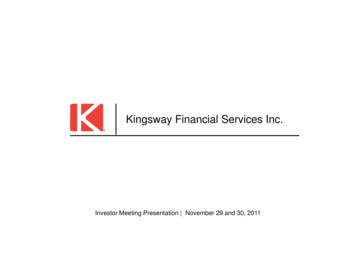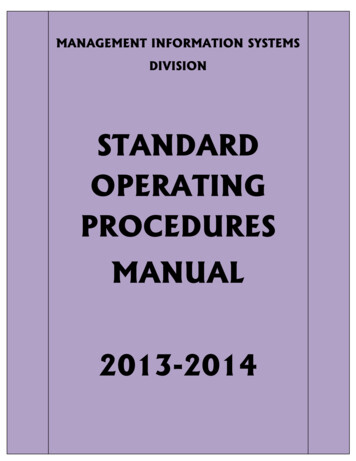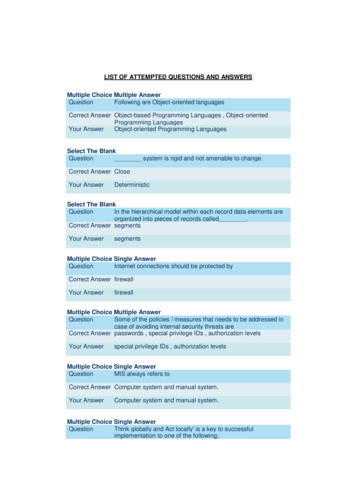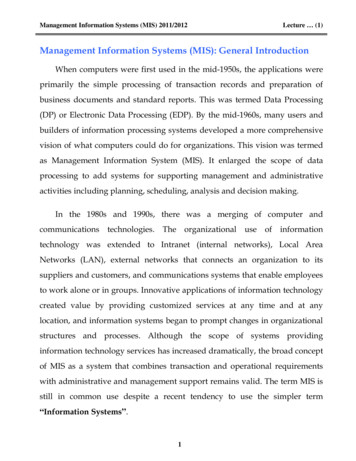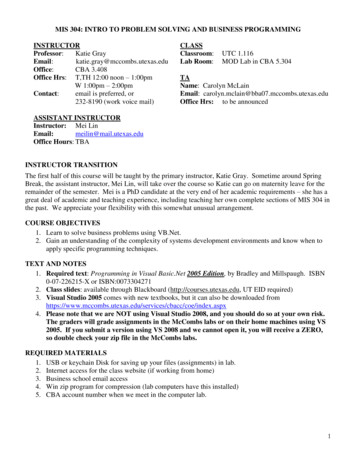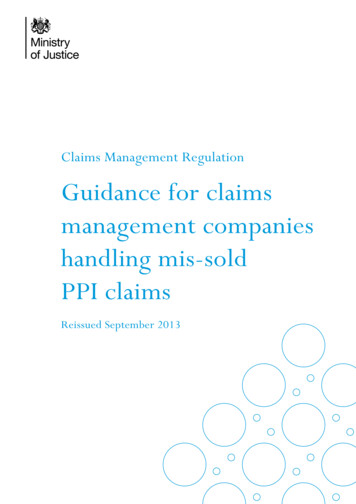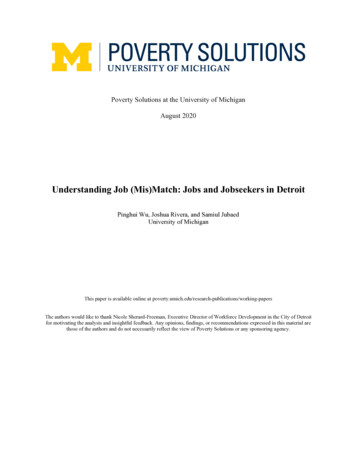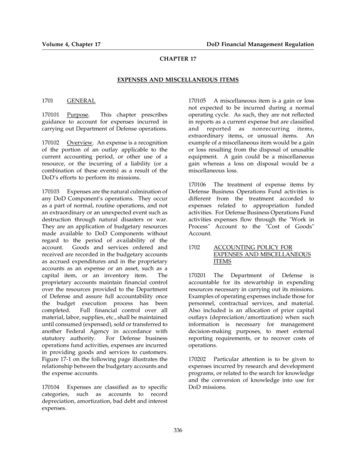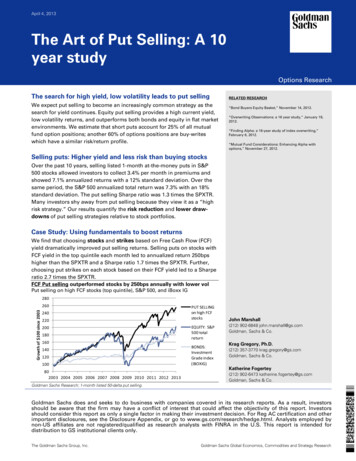
Transcription
House of CommonsCommittee of Public AccountsFinancial servicesmis-selling: regulationand redressForty-first Report of Session 2015–16HC 847
House of CommonsCommittee of Public AccountsFinancial servicesmis-selling: regulationand redressForty-first Report of Session 2015–16Report, together with formal minutes relatingto the reportOrdered by the House of Commonsto be printed 9 May 2016HC 847Published on 13 May 2016by authority of the House of Commons
The Committee of Public AccountsThe Committee of Public Accounts is appointed by the House ofCommons to examine “the accounts showing the appropriation of thesums granted by Parliament to meet the public expenditure, and of suchother accounts laid before Parliament as the committee may think fit”(Standing Order No. 148).Current membershipMeg Hillier (Labour (Co-op), Hackney South and Shoreditch) (Chair)Mr Richard Bacon (Conservative, South Norfolk)Harriett Baldwin (Conservative, West Worcestershire)Deidre Brock (Scottish National Party, Edinburgh North and Leith)Chris Evans (Labour (Co-op), Islwyn)Rt Hon Caroline Flint (Labour, Don Valley)Kevin Foster (Conservative, Torbay)Mr Stewart Jackson (Conservative, Peterborough)Nigel Mills (Conservative, Amber Valley)David Mowat (Conservative, Warrington South)Stephen Phillips (Conservative, Sleaford and North Hykeham)Bridget Phillipson (Labour, Houghton and Sunderland South)John Pugh (Liberal Democrat, Southport)Karin Smyth (Labour, Bristol South)Mrs Anne-Marie Trevelyan (Conservative, Berwick-upon-Tweed)PowersPowers of the Committee of Public Accounts are set out in House ofCommons Standing Orders, principally in SO No. 148. These are availableon the Internet via www.parliament.uk.PublicationCommittee reports are published on the Committee’s website atwww.parliament.uk/pac and in print by Order of the House.Evidence relating to this report is published on the inquiry publicationspage of the Committee’s website.Committee staffThe current staff of the Committee are Stephen McGinness (Clerk),Dr Mark Ewbank (Second Clerk), George James (Senior CommitteeAssistant), Sue Alexander and Ruby Radley (Committee Assistants), andTim Bowden (Media Officer).ContactsAll correspondence should be addressed to the Clerk of the Committeeof Public Accounts, House of Commons, London SW1A 0AA. Thetelephone number for general enquiries is 020 7219 4099; theCommittee’s email address is pubaccom@parliament.uk.
Financial services mis-selling: regulation and redress1ContentsSummary3Introduction4Conclusions and recommendations51Claiming compensation8Claims management companies8The Ombudsman’s backlog of PPI cases923Regulating to prevent mis-selling10The culture within firms10Consumer understanding and awareness11Assessing the effectiveness of regulation13Measuring whether regulation is working13Parliamentary scrutiny14Formal Minutes15Witnesses16Published written evidence16List of Reports from the Committee during the current Parliament17
Financial services mis-selling: regulation and redressSummaryWe are disappointed that claims management companies have made up to 5 billionfrom payment protection insurance claims, out of compensation that should have beenpaid to victims of mis-selling by financial services firms. Departments and regulatorshave been far too passive in allowing this to happen. Many victims of payment protectioninsurance mis-selling have been waiting years for a decision from the Ombudsman andfor the compensation they are entitled to. The Financial Conduct Aithority (the FCA)has taken action to tackle some of the root causes of mis-selling of financial services,but there remain substantial risks of further mis-selling, as well as cultural problemswithin firms that make mis-selling more likely. The FCA and the Treasury must domore to know how much mis-selling is happening now, and which regulatory activitieswork best to prevent it.3
4Financial services mis-selling: regulation and redressIntroductionMis-selling of financial services and products takes many forms and can cause seriousharm to consumers. Mis-selling happens for several reasons: products are complex anddifficult to understand for even very knowledgeable consumers, and the culture andincentives within firms can make mis-selling more likely. Over 12 million consumerswere mis-sold payment protection insurance (PPI), and firms have paid over 22 billion incompensation to them since April 2011. The Financial Conduct Authority (FCA), as leadregulator of financial services firms’ conduct, plays a key role in preventing and detectingmis-selling, and in responding to it when it happens, including arranging for redress foraffected customers. The Financial Ombudsman Service (the Ombudsman) also plays arole in redress, by resolving disputes between individual consumers and firms. In recentyears, claims management companies, which are currently regulated by the Ministry ofJustice, have submitted most consumer complaints to the Ombudsman. HM Treasury isresponsible for designing the regulation and redress framework for financial services.
Financial services mis-selling: regulation and redress5Conclusions and recommendations1.Claims management companies have taken up to 5 billion out of compensationthat should have gone to consumers. It is straightforward and free for affectedconsumers to claim compensation through the Ombudsman for mis-sold paymentprotection insurance. Yet in 2014–15, 80% of complaints to the Ombudsman aboutPPI were made through claims management companies. In many cases, thesecompanies merely package up payment protection insurance claims, but theytypically charge between a quarter and a third of any compensation subsequentlypaid. The National Audit Office estimates that claims management companiesreceived between 3.8 billion and 5 billion in commission from PPI paymentsbetween April 2011 and November 2015. Collectively, the public bodies involved—the Treasury, the Ministry of Justice, the FCA and the Ombudsman—have beentoo slow in taking responsibility for this situation, and too passive in allowing itto happen. The problem of claims management companies taking too much of thecompensation intended for victims of mis-selling was entirely predictable. Similarproblems have harmed previous compensation schemes, for example, in 2008 theCommittee of Public Accounts found that solictors and other representatives hadtaken almost 1.3 billion out of compensation intended for former coal miners.The Treasury and the Ministry of Justice recently published a review of claimsmanagement regulation. Action now is too late but is still important, particularly asclaims management activity may increase further if the FCA introduces a deadlinefor making PPI claims.Recommendation: HM Treasury and the Ministry of Justice should report publiclyon the effectiveness of their actions in reducing the role of claims managementcompanies in PPI compensation. The Treasury and the FCA should demonstratehow they will ensure that these problems do not happen again with future schemes.2.The Ombudsman has a large backlog of PPI claims, with many consumershaving to wait more than 2 years for a decision. There were around 400,000 newPPI claims to the Ombudsman in both 2012–13 and 2013–14, compared to around120,000 in 2010–11. The Ombudsman has reduced the number of open paymentprotection insurance cases from 445,000 in May 2013 to 234,000 in November 2015,but it has a large backlog of older cases—45% of open cases are more than 1 yearold, and 17% (39,300) are more than 2 years old. In 2015–16 so far, half of PPI caseshave taken 15 months or more to close. Although factors outside the Ombudsman’scontrol may play a part, the Ombudsman did not give a convincing account of whymany cases are taking so long to complete. The Ombudsman has told the NAO thatit aims to clear the backlog of older cases by July 2017, but it has not yet outlined aplan for doing so.Recommendation: By the end of July 2016, the Ombudsman should set outpublicly a clear timetable for reducing and ultimately eliminating its backlog ofPPI claims, and also report publicly on its progress.
6Financial services mis-selling: regulation and redress3.The FCA has not done enough to tackle the cultural problems that lie behindmis-selling by financial services firms. The cultures of firms and the nature of theirsales incentives have been identified as key factors behind mis-selling. The FCA hastaken some action to deal with these root causes, for instance by promoting changesto firms’ incentive structures and better training of financial advisers. The SeniorManagers Regime, which the Government is introducing for banks from 2016,aims to get senior people to take greater responsibility for the actions of those theymanage. But the risks of mis-selling remain, for example pensions freedoms reformsare a potential trigger for future mass mis-selling. Middle managers in financialservices firms were often promoted on the basis of achieving sales targets, makingit hard to embed more customer-focussed approaches. The FCA has withdrawn aplanned review of banks’ culture, but has not articulated what culture it expectsfirms to have. There is no guarantee that any improvements in cultures will stick asthe regulatory spotlight moves away.Recommendation: The FCA should outline the actions it will take to improvecultures in financial services firms, and report to us on their effectiveness in ayear’s time.4.The FCA does not do enough to ensure that consumers understand the financialproducts they are buying and the possibility of claiming compensation. Financialservices are complex to understand, even for the most knowledgeable consumers,and this can mean that consumers in this market are particularly susceptible tomis-selling. As conduct regulator, the FCA aims to protect consumers. It told usthat it welcomes innovation in new products, for instance in the pensions marketto provide greater choice to consumers who do not want to buy an annuity. Butproduct innovation can also make mis-selling more likely, particularly if productsare especially complex. The NAO found that the FCA emphasises ensuring thatfirms adhere to detailed rules, rather than ensuring that firms do enough to checkthat customers fully understand the products they buy. Consumers also need to beaware that they may be eligible for compensation when mis-selling has occurred.In complaints-led redress schemes, consumers are required to complain to theirprovider and then the Ombudsman (if necessary). The FCA and the Ombudsmando not appear to have sufficiently considered greater use of automatic enrolment ofvictims of mis-selling into compensation schemes.Recommendation: The FCA should set out what more it will do ensure firms checkconsumer understanding of the products they purchase and of their rights to claimcompensation, particularly for vulnerable consumers, and report back to us onthis work in a years’s time.5.The Treasury does not know how effective the FCA is in reducing mis-selling,and there are no good indicators of the current level of mis-selling. Preventing,detecting and responding to mis-selling is an important part of the FCA’s activities—there have been over 2 million consumer complaints to firms about mis-selling ineach of the last 3 years, mostly due to payment protection insurance. Mis-selling isthe most common area for complaints to the Ombudsman, accounting for 70% ofthe total complaints it received between 2010–11 and 2014–15. But complaints dataprovide an imperfect indicator of current mis-selling levels because complaints mayreflect past mis-selling rather than continued problems. The FCA’s information on
Financial services mis-selling: regulation and redress7complaints to firms does not identify when alleged mis-selling took place and it doesnot yet draw together information that could show whether its actions are reducingmis-selling. The FCA does not link the outcomes from its regulatory activities totheir associated costs and this means it cannot know whether it has taken the mostcost-effective actions. HM Treasury, which is responsible for the overall regulationand redress framework, could not explain convincingly how it would know if theregulatory system is succeeding or failing, and has not developed any meaningfulmeasures of what success looks like.Recommendation: HM Treasury and the FCA should develop ‘real-time’ indicatorsof the extent of mis-selling, and assess regularly how effective their actions are inreducing it.6.Parliamentary accountability for financial regulation is undermined byrestrictions on the NAO’s access to information held by the FCA. In order toexamine the effectiveness of the FCA in relation to mis-selling, the NAO needsto gather evidence on how the FCA has influenced the actions and behaviours offirms, in line with its regulatory objectives. For example, it needs information on theactions undertaken by firms in response to FCA work on sales incentive schemes,which would include information on bonuses. However, current legislation preventsthe FCA from releasing certain confidential information that the FCA holds onfirms. The NAO has access to commercially confidential information across a widerange of other government activities, and also to highly sensitive defence, securityand intelligence information for the purposes of undertaking its work. Followingthe financial crisis, the Committee of Public Accounts reported on the need forgreater parliamentary accountability for financial regulation.Recommendation: HM Treasury should outline a timetable for proposinglegislation to give the NAO access to information so that it can carry out fullexaminations of value for money.
8Financial services mis-selling: regulation and redress1 Claiming compensation1. On the basis of a report by the Comptroller and Auditor General, we took evidencefrom the Financial Conduct Authority, the Financial Ombudsman Service and HMTreasury.12. Mis-selling of finan
Mis-selling happens for several reasons: products are complex and difficult to understand for even very knowledgeable consumers, and the culture and incentives within firms can make mis-selling more likely. Over 12 million consumers were mis-sold payment protection insurance (PPI), and firms have paid over 22 billion in compensation to them since April 2011. The Financial Conduct Authority .


